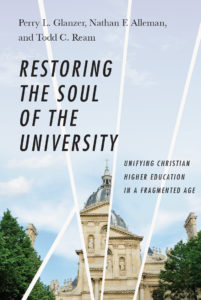“The Christian academic vocation is first and foremost defined by thinking about and living one’s vocation in the light of the triune God and God’s story of the world. These elements not only nourish the university’s soul but should also define professors’ fundamental identities and direct them to engage in certain story-formed virtues and practices that shape their vocations in unique ways. Thinking and living in the light of God and God’s story can also foster an integrated relationship for teaching, scholarship, and service as well as an integrated identity and life purpose. As image bearers of God we can then pursue a coinherence reflected in the Trinity. The vocation of the Christian scholar is defined by a different story, identity, and purpose. As a result, the Christian scholar is free to fulfill his or her calling without having one’s soul fragmented by it. . . .

Overall, a Christian approach to the disciplines must start with learning the liberating arts of worship and humility that nurture loving gratitude and obedience to Jesus. This foundation provides an education for the free person—the pursuit of manifold excellence without idolatry not only in a particular academic vocation but also in all the other vocations where we seek to be image bearers of God. Developing this particular capacity for this specific identity is indeed an education of a free person. . . .
As opposed to the negative critique of the university as a bubble, we believe [Wendell] Berry provides some insight into a more positive metaphor that can reframe the nature of the undergraduate experience. The university provides what we call a greenhouse community. A greenhouse is a place where young plants are nurtured within a protected environment marked by consistent temperature, ready access to nourishment, and attentive care from those skilled in fostering the transition from seedling to stable plant. Few people would critique a greenhouse for failing to provide a “real world” experience. Indeed, that it does not, is exactly the point. However, in many cases it is intended to be a temporary arrangement that prepares fragile plants to then be transplanted into stable and often long-term locations where the natural elements can be endured with success. Similarly, the university creates what it hopes to be the ideal conditions for growth by providing resources for the holistic development of a certain age demographic. It does, however, want the student to eventually leave the protective and nurturing greenhouse community and not become dependent on it. It also needs to discourage students from viewing the “greenhouse” period of life as an ideal state to be sought again after departure. The university is not meant to be a long-term community of students, nor one they should venerate.” — Restoring the Soul of the University: Unifying Christian Higher Education in a Fragmented Age by Perry L. Glanzer, Nathan F. Alleman, and Todd C. Ream (Downers Grove, IL: InterVarsity Press, 2017, 255-256, 271, 277).
Thank-you to InterVarsity Press for bringing Restoring the Soul of the University to my attention!
- As I have pressed into my exploration of Defining and Discerning Calling: Assisting a Student’s Academic Journey with a Focus upon Emerging Scholars Engaged in Postbaccalaureate Higher Education, I have found Restoring the Soul of the University a significant resource for relational, incarnational theology in the context of higher education.
- Furthermore, the work of Perry L. Glanzer, Nathan F. Alleman, and Todd C. Ream has deepened my commitment to urging student ministry in secular contexts to offer a vocational “greenhouse community” to assist students to live / work missionally as students in preparation to wherever the Lord leads. The time to grow as a “little Christ,” part of the Body of Christ, who loves God (primary) and neighbor as a whole person (head, heart, and hands) to advance the Kingdom of God to the glory of God is now. What an opportunity for witness / outreach throughout the educational journey (students, faculty, administrators), one which I long for my twin daughters to engage as the press into their senior year of high school and prayerfully consider next steps.
- For Bob Trube’s review of Restoring the Soul of the University click here.
- For additional Emerging Scholars Network blog posts tagged Ministry to Emerging Generations, follow this link.
Tom enjoys daily conversations regarding living out the Biblical Story with his wife Theresa and their four girls, around the block, at Elizabethtown Brethren in Christ Church (where he teaches adult electives and co-leads a small group), among healthcare professionals as the Northeast Regional Director for the Christian Medical & Dental Associations (CMDA), and in higher ed as a volunteer with the Emerging Scholars Network (ESN). For a number of years, the Christian Medical Society / CMDA at Penn State College of Medicine was the hub of his ministry with CMDA. Note: Tom served with InterVarsity Christian Fellowship / USA for 20+ years, including 6+ years as the Associate Director of ESN. He has written for the ESN blog from its launch in August 2008. He has studied Biology (B.S.), Higher Education (M.A.), Spiritual Direction (Certificate), Spiritual Formation (M.A.R.), Ministry to Emerging Generations (D.Min.). To God be the glory!

Leave a Reply